-
01-01-2015
Low birth weight in a municipality in the southeast region of Brazil
Revista Brasileira de Enfermagem. 2015;68(6):1169-1175
Abstract
Low birth weight in a municipality in the southeast region of Brazil
Revista Brasileira de Enfermagem. 2015;68(6):1169-1175
DOI 10.1590/0034-7167.2015680624i
Views0See moreABSTRACT
Objective:
to identify the prevalence of low birth weight in the city of São Paulo.
Method:
epidemiological cross-sectional study with data collected by means of the Brazilian Live Birth Information System related to births occurred in the city of São Paulo between 2007 and 2013. Maternal, gestational, childbirth, and neonatal variables were analyzed descriptively and by association.
Results:
9.65% (1,342,655) of live births were underweight (mean of 3234.55 grams in the term group and 2312.17 in the pre-term group) with a mean maternal age of 27.53 years old. The risk factors identified include maternal age, not having a partner, low maternal level of education, other race rather than white, pre-term pregnancy, multiple births, low number of prenatal check-ups, and cesarean delivery.
Conclusion:
knowledge of this evidence favors planning the care provided by defining strategies to reduce it and consequently improve maternal and infant health care.

-
01-01-2015
Gait speed and cognitive score in elderly users of the primary care service
Revista Brasileira de Enfermagem. 2015;68(6):1163-1168
Abstract
Gait speed and cognitive score in elderly users of the primary care service
Revista Brasileira de Enfermagem. 2015;68(6):1163-1168
DOI 10.1590/0034-7167.2015680623i
Views0See moreABSTRACT
Objective:
to investigate the association between gait speed and the cognitive score of elderly patients enrolled in a Basic Health Unit.
Method:
a quantitative cross-sectional study with 203 elderly, a sample calculated based on the estimated population proportion. Data were collected using a sociodemographic and clinical questionnaire, gait speed test (GS) and the Mini Mental State Examination (MMSE).
Results:
the illiterate patients had a mean MMSE=19.33(±3.7) and GS = 0.76m/s (±0.3); those with low/medium education had a MMSE = 25.43(±2.8) and GS = 0.92m/s (±0.2); and the elderly with higher education had a MMSE = 27.33(±2.9) and GS=1.12m/s (±0.3).There was a weak correlation (R2=00354) between gait speed and cognitive score, with statistical significance (Prob>F = 0.0072) and a positive linear trend.
Conclusion:
the better cognitive score the higher the gait speed; the illiterate elderly were those with lower gait speed, thereby indicating a poorer physical performance.
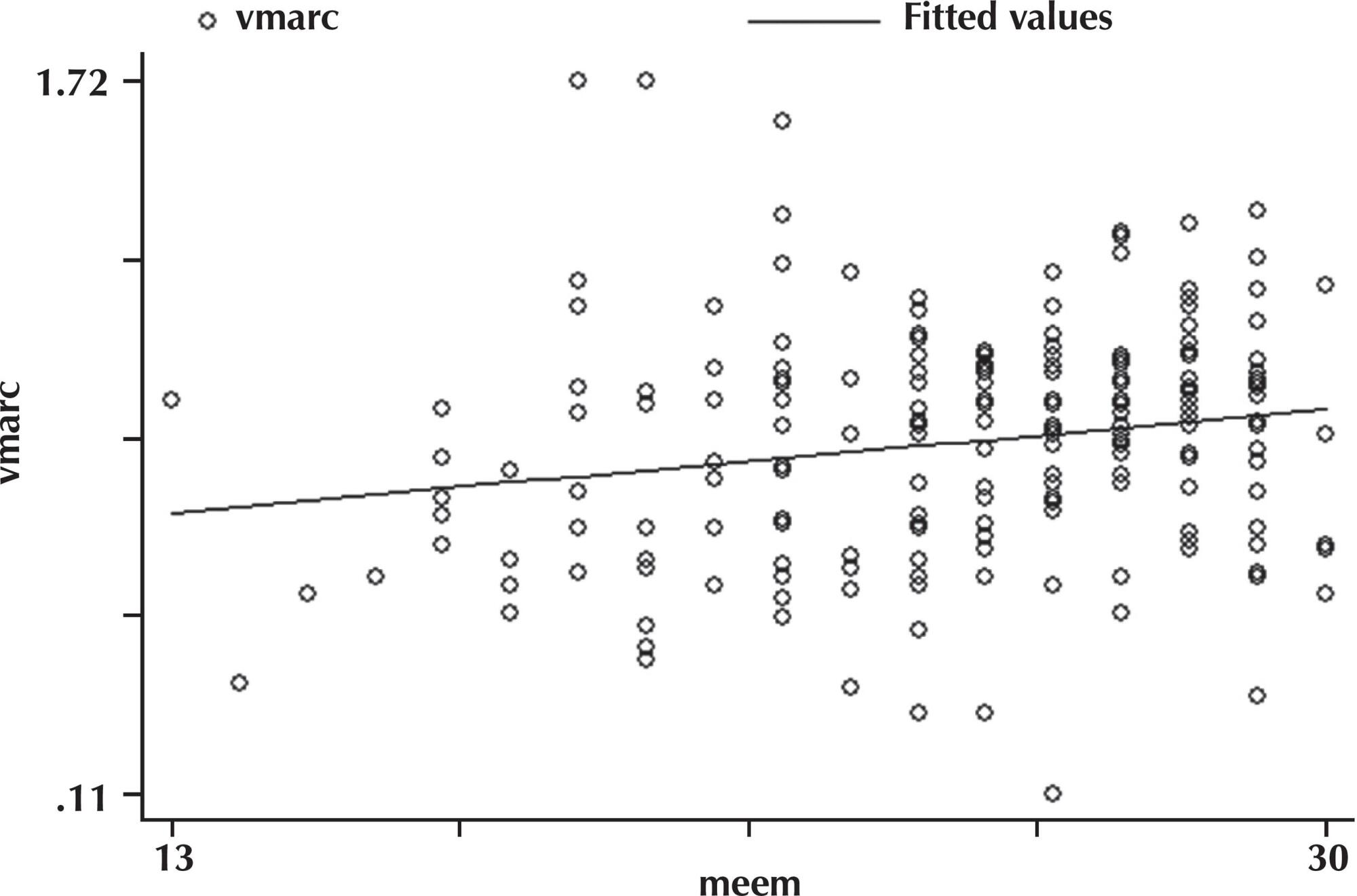
-
01-01-2015
Fluid and dietary restriction’s efficacy on chronic kidney disease patients in hemodialysis
Revista Brasileira de Enfermagem. 2015;68(6):1154-1162
Abstract
Fluid and dietary restriction’s efficacy on chronic kidney disease patients in hemodialysis
Revista Brasileira de Enfermagem. 2015;68(6):1154-1162
DOI 10.1590/0034-7167.2015680622i
Views0See moreABSTRACT
Objective:
to identify self-care measures to manage fluid and dietary restrictions and assess their effectiveness.
Method:
descriptive-correlational study and cluster analysis with 254 chronic renal failure patients on regular hemodialysis program, handled by hemodiafiltration. We evaluated the effectiveness of self-care by interdialytic weight gain (IWG) and by potassium and phosphorus serum pre-dialysis serum levels.
Results:
several self-care measures were significantly correlated with a lower IWG and a lower level of pre-dialysis phosphorus. Patients most often use measures to reduce salt consumption than measures to restrict potassium and dietary phosphorus. The spouse provides important support dietary management. Subjects who use more often the self-care measure are mostly female, are older, less IWG and have a higher Kt/V.
Conclusion:
these results can contribute to the nursing educational support.
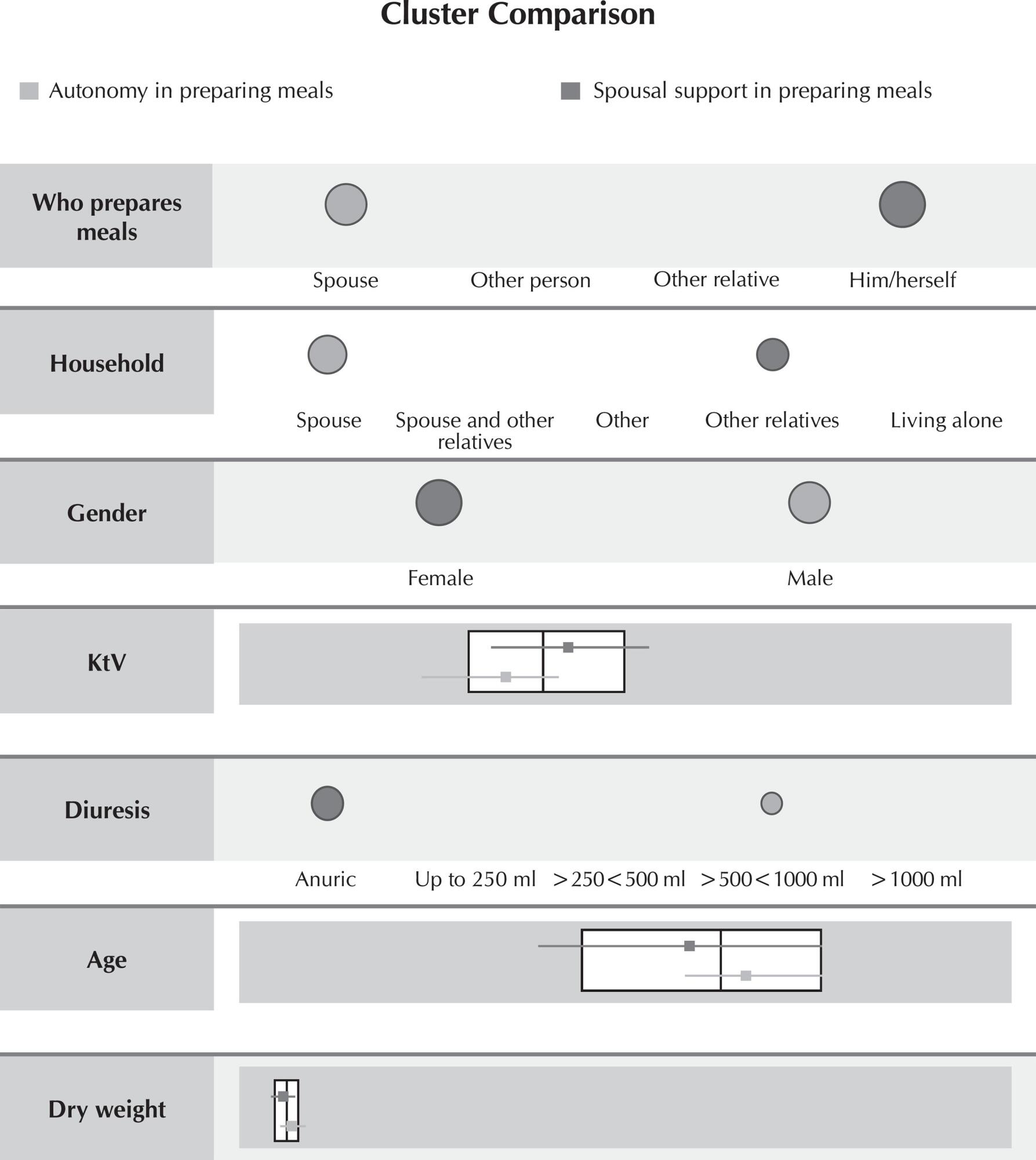
-
01-01-2015
Validation of newborn positioning protocol in Intensive Care Unit
Revista Brasileira de Enfermagem. 2015;68(6):1147-1153
Abstract
Validation of newborn positioning protocol in Intensive Care Unit
Revista Brasileira de Enfermagem. 2015;68(6):1147-1153
DOI 10.1590/0034-7167.2015680621i
Views0See moreRESEARCH
Objective:
to verify the positioning indications of newborn sand build a standard operating procedure protocol for newborn positioning in Neonatal Intensive Care Unit (NICU).
Method:
for protocol validation, the Delphi technique was used ,in which expert nurses in the field reviewed the proposed procedure.
Results:
we present the results of this validation in a protocol form, to contribute to the discussion about newborn positioning in NICU and standardization of nursing care related to positioning. We evaluated ten indicators, in which there was agreementof100.0% in seven, and of80% in three, above the 60% recommended by the validation technique.
Conclusion:
given the importance of newborn positioning in NICU for its neuromuscular development, this study contributes to the adoption of an evidence-based practice for nursing.
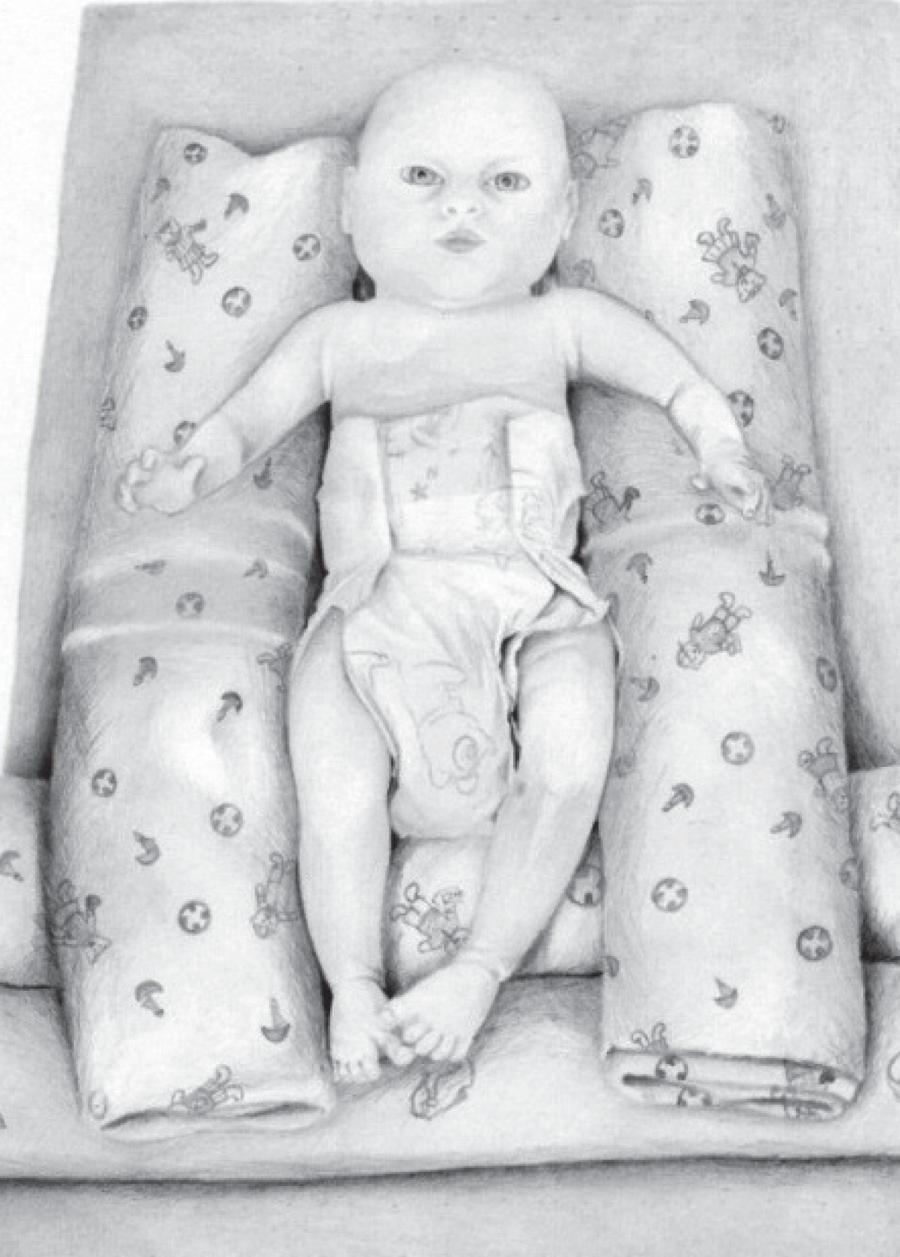
-
01-01-2015
Patient safety culture in a bone marrow transplantation unit
Revista Brasileira de Enfermagem. 2015;68(6):1139-1146
Abstract
Patient safety culture in a bone marrow transplantation unit
Revista Brasileira de Enfermagem. 2015;68(6):1139-1146
DOI 10.1590/0034-7167.2015680620i
Views0See moreABSTRACT
Objective:
evaluate the patient safety culture in the perspective of health professionals from a bone marrow transplantation unit of an oncology research center, at a reference hospital for cancer treatment in Santa Catarina, Brazil.
Method:
a quantitative cross-sectional study that used the Safety Attitudes Questionnaire was conducted between August and September 2013. The study analyzed 33 professional surveys. Statistical data analysis used descriptive and inferential statistics.
Results:
among the dimensions analyzed, only “job satisfaction” reached a mean score above 75, considered positive in terms of patient safety culture.
Conclusion:
the dimensions of safety culture present in the survey have to be valued by professionals and managers to allow safe patient care.
-
01-01-2015
Job satisfaction of nursing staff in a university hospital
Revista Brasileira de Enfermagem. 2015;68(6):1130-1138
Abstract
Job satisfaction of nursing staff in a university hospital
Revista Brasileira de Enfermagem. 2015;68(6):1130-1138
DOI 10.1590/0034-7167.2015680619i
Views0See moreABSTRACT
Objective:
identify the determinants of job satisfaction of the nursing staff of a public university hospital.
Method:
secondary study with mixed data approach and simple and multiple linear regression. A total of 115 subjects participated in the study, 41 nurses and 74 nursing assistants and technicians. The data collection occurred in 2013 using the QST-Caism questionnaire.
Results:
education, hierarchical level and workplace constitute job satisfaction determinants. However, age, gender, job and work period did not show this relationship. More educated workers held low job satisfaction if exercised not graduated nursing functions.
Conclusion:
graduated workers who perform high school functions are more unsatisfied than those who have high school function and qualification.
-
01-01-2015
Medical waste in mobile prehospital care
Revista Brasileira de Enfermagem. 2015;68(6):1122-1129
Abstract
Medical waste in mobile prehospital care
Revista Brasileira de Enfermagem. 2015;68(6):1122-1129
DOI 10.1590/0034-7167.2015680618i
Views0See moreABSTRACT
Objective:
the objective of this study is to identify how Medical Waste (MW) is managed in Mobile Prehospital Care (MPC) services in the state of São Paulo as well as characterize and quantify this waste.
Method:
exploratory and descriptive field study with data collection based on the methodology proposed by the Pan American Health Organization (PAHO), which was conducted over eight consecutive days to identify the production and characteristics of generated waste.
Results:
it was found that the MW management of the MPC is not yet in line with the requirements of RDC 306/04, which could affect the occupational safety of workers, patients, the community, and the environment.
Conclusion:
it is recommended for the health managers to focus on this issue. The lack of studies with regard to MPC also indicates the need for further studies on the waste management.

-
01-01-2015
Severe lactational mastitis: particularities from admission
Revista Brasileira de Enfermagem. 2015;68(6):1116-1121
Abstract
Severe lactational mastitis: particularities from admission
Revista Brasileira de Enfermagem. 2015;68(6):1116-1121
DOI 10.1590/0034-7167.2015680617i
Views0See moreABSTRACT
Objective:
to identify characteristics of women who have suffered severe lactational mastitis.
Method:
a descriptive, retrospective, documentary, quantitative study was performed. Data were collected from patient records of 114 hospitalized women from January of 2009 to December of 2013. Data were analyzed by using descriptive statistics.
Results:
a higher percentage of severe lactational mastitis was found in young, primiparous women who had completed high school, who had no partner, and did not have a job; 96.5% of women had breast complications before admission and remained hospitalized an average of 4.4 days; at discharge, 23.7% of women had weaned their infants.
Conclusion:
this study showed that severe lactational mastitis can cause great harm to the woman and the baby.
-
ORIGINAL ARTICLE12-16-2024
Narratives of sex workers: intimate partner violence and coping strategies
Revista Brasileira de Enfermagem. 2024;77(6):e20240180
Abstract
ORIGINAL ARTICLENarratives of sex workers: intimate partner violence and coping strategies
Revista Brasileira de Enfermagem. 2024;77(6):e20240180
DOI 10.1590/0034-7167-2024-0180
Views0See moreABSTRACT
Objectives:
to understand the narratives of sex workers about violence suffered by intimate partners and their coping strategies.
Methods:
qualitative research, focused on thematic oral history, carried out with six sex workers in southern Brazil, who responded to in-depth interviews using a flexible script. Thematic content analysis was used.
Results:
the study included cisgender women who self-identified as half black and half white. Most had children and were separated. They reported abusive relationships by their intimate partners, with emphasis on verbal, psychological, financial, and physical violence and attempted femicide. Such violence resulted in coping strategies, such as avoiding emotional bonds and maintaining a discreet life.
Final Considerations:
intimate partner violence is prevalent among participants, leading them to adopt strategies to preserve their safety and well-being, highlighting the need for public policies that meet their particularities and guarantee protection.
-
ORIGINAL ARTICLE12-16-2024
Software for the care of people with cardiovascular risk: construction and evidence of validity
Revista Brasileira de Enfermagem. 2024;77(6):e20240276
Abstract
ORIGINAL ARTICLESoftware for the care of people with cardiovascular risk: construction and evidence of validity
Revista Brasileira de Enfermagem. 2024;77(6):e20240276
DOI 10.1590/0034-7167-2024-0276
Views0See moreABSTRACT
Objectives:
to build and validate software for the care of people with cardiovascular risk.
Methods:
a methodological study, applied to software development, anchored in a nursing theory and classification system, in three stages: 1) requirements engineering; 2) software architecture and coding; and 3) testing and content validity by 12 experts in computer science, with a Content Validity Ratio score.
Results:
called e-TEORISC, in software format, for nursing care for people with cardiovascular risk, online and offline, containing a database linked to the Nursing Process stages. Experts considered that the attributes of functional suitability, performance efficiency, reliability, maintainability, usability, safety and portability obtained desirable scores.
Conclusions:
e-TEORISC has evidence of validity to instrumentalize care for people at cardiovascular risk, with potential for technology transfer to the Brazilian Health System.

-
ORIGINAL ARTICLE08-30-2024
Meanings attributed to changes experienced by individuals after COVID-19 hospitalization
Revista Brasileira de Enfermagem. 2024;77:e20230122
Abstract
ORIGINAL ARTICLEMeanings attributed to changes experienced by individuals after COVID-19 hospitalization
Revista Brasileira de Enfermagem. 2024;77:e20230122
DOI 10.1590/0034-7167-2023-0122
Views0See moreABSTRACT
Objectives:
to understand the meanings attributed to the experiences of individuals after hospitalization for COVID-19.
Methods:
qualitative study, with a theoretical framework based on Symbolic Interactionism and a methodological approach grounded in Grounded Theory. Nineteen participants who had moderate and severe forms of COVID-19 after hospitalization were interviewed. Data collection took place between April and November 2021 through online interviews, and the data were analyzed using initial and focused coding in the MAXQDA software.
Results:
the data illustrate new meanings attributed to different aspects of life after hospitalization, including relationships with others, the environment, physical and mental health, finances, identity, and interactions with a new social reality.
Conclusions:
the meanings are intrinsically linked to the value of interpersonal relationships, the perception of their impact, and the consequences after hospitalization. This allows professionals to understand the importance of this information to improve care and prepare for future epidemics.

-
ORIGINAL ARTICLE08-30-2024
Patient safety culture in times of the COVID-19 pandemic: a cross-sectional study in a hospital
Revista Brasileira de Enfermagem. 2024;77:e20230187
Abstract
ORIGINAL ARTICLEPatient safety culture in times of the COVID-19 pandemic: a cross-sectional study in a hospital
Revista Brasileira de Enfermagem. 2024;77:e20230187
DOI 10.1590/0034-7167-2023-0187
Views0See moreABSTRACT
Objectives:
to assess patient safety culture during the COVID-19 pandemic and identify the dimensions that need to be improved in hospital settings and which sector, open or closed, direct or indirect care, exhibits a higher level of safety culture.
Methods:
a descriptive and cross-sectional study. The validated version for Brazil of the Hospital Survey on Patient Safety Culture instrument was applied to assess patient safety culture. Those dimensions with 75% positive responses were considered strengthened.
Results:
all dimensions presented results lower than 75% of positive responses. Closed sectors showed a stronger safety culture compared to open ones. Indirect care sectors had a low general perception of patient safety when compared to direct care sectors.
Conclusions:
with the pandemic, points of weakness became even more evident, requiring attention and incisive interventions from the institution’s leaders.

-
REVIEW08-30-2024
Educational actions conducted during the pandemic with primary health care professionals: a scoping review
Revista Brasileira de Enfermagem. 2024;77:e20230352
Abstract
REVIEWEducational actions conducted during the pandemic with primary health care professionals: a scoping review
Revista Brasileira de Enfermagem. 2024;77:e20230352
DOI 10.1590/0034-7167-2023-0352
Views0See moreABSTRACT
Objectives:
to map the educational actions conducted with primary health care professionals during the COVID-19 pandemic.
Methods:
a scoping review conducted in August 2023, which covered databases such as CINAHL, Medline, LILACS, IBECS, BDENF, and Web of Science. In total, 32 publications were analyzed through content analysis.
Results:
the primary beneficiaries of the educational actions included 69% physicians, 56% nurses, 25% pharmacists, 13% social workers and dentists, 9% psychologists, community health agents, and laboratory professionals, and 6% nursing technicians, nutritionists, and physical educators. The predominant educational interventions were training sessions (mentioned in 19 publications), followed by Continuing Health Education (10 publications) and Continuing Education (three publications).
Final Considerations:
the educational interventions demonstrated positive impacts on professional practice, particularly the Continuing Health Education actions, which were notable for stimulating critical problem-solving among professionals.

-
REVIEW08-30-2024
Impact of financial toxicity on adults with cancer during the COVID-19 pandemic: an integrative review
Revista Brasileira de Enfermagem. 2024;77:e20240078
Abstract
REVIEWImpact of financial toxicity on adults with cancer during the COVID-19 pandemic: an integrative review
Revista Brasileira de Enfermagem. 2024;77:e20240078
DOI 10.1590/0034-7167-2024-0078
Views0See moreABSTRACT
Objectives:
to identify the repercussions of financial toxicity on the lives of adult cancer patients during the COVID-19 pandemic.
Methods:
an integrative review was conducted using the PubMed, Web of Science, Scopus, and Embase databases, as well as the Virtual Health Library portal, in March 2023.
Results:
out of 62 studies found, 13 were included for analysis. The primary repercussions of financial toxicity included difficulties in covering basic expenses such as food, housing, medication, transportation, and internet access; increased anxiety and concerns related to health and financial situations; reduction or absence of income; challenges in obtaining treatment or accessing healthcare services; rising expenses; and telemedicine as a less burdensome alternative.
Conclusions:
the pandemic has exacerbated financial toxicity; therefore, healthcare teams must recognize it as an adverse event of oncological treatment and understand its potential to affect various aspects of patients’ lives.

-
03-08-2024
Nursing as a player in tackling vaccine hesitancy and refusal
Revista Brasileira de Enfermagem. 2024;77:e77suppl101
Abstract
Nursing as a player in tackling vaccine hesitancy and refusal
Revista Brasileira de Enfermagem. 2024;77:e77suppl101
DOI 10.1590/0034-7167.202477suppl101
Views1Since the 1970s, the Brazilian Ministry of Health established the Brazilian National Immunization Program (PNI – Programa Nacional de Imunização), which preceded the Brazilian Health System and which was incorporated and strengthened due to the decentralized model to municipalities, but under single command at central level. Its objective was and still is to coordinate vaccination […]See more -
12-16-2024
Religión y experiencia profesional: ¿Serán predictores de la inteligencia espiritual de los enfermeros? Estudio transversal
Revista Brasileira de Enfermagem. 2024;77(6):e20240217
Abstract
Religión y experiencia profesional: ¿Serán predictores de la inteligencia espiritual de los enfermeros? Estudio transversal
Revista Brasileira de Enfermagem. 2024;77(6):e20240217
DOI 10.1590/0034-7167-2024-0217es
Views1See moreRESUMEN
Objetivos:
analizar la relación entre religión y experiencia profesional con la inteligencia espiritual en enfermeros.
Métodos:
estudio transversal y analítico realizado en 2021, participaron 544 profesionales de enfermería que laboraban en establecimiento de salud de Perú durante la pandemia por COVID-19. Para el análisis de los datos se emplearon el análisis de regresión múltiple y correlación de Pearson.
Resultados:
en los enfermeros predominó un nivel de inteligencia espiritual saludable (42,8%). Quienes no profesaban una religión tenían mayor probabilidad de tener menor puntaje de inteligencia espiritual (escala global y dimensiones); sin embargo, los enfermeros expertos tuvieron mayor probabilidad de tener mayor inteligencia espiritual (escala global y dimensiones) que los enfermeros novatos (p<0,05).
Conclusiones:
la inteligencia espiritual en los enfermeros fue predicha por la religión y la experiencia profesional. Este hallazgo sugiere que la inteligencia espiritual en enfermería se consolida mediante prácticas religiosas y durante el ejercicio profesional.
-
ORIGINAL ARTICLE10-25-2022
Clinical characterization, disability, and mortality in people with strokes during 90 days
Revista Brasileira de Enfermagem. 2022;75(2):e20201383
Abstract
ORIGINAL ARTICLEClinical characterization, disability, and mortality in people with strokes during 90 days
Revista Brasileira de Enfermagem. 2022;75(2):e20201383
DOI 10.1590/0034-7167-2020-1383
Views0See moreABSTRACT
Objectives:
to describe clinical characteristics and mortality of people with ischemic cerebrovascular accidents (strokes); to compare disability before the event and 90 days after.
Methods:
longitudinal study with 308 people hospitalized in Salvador-BA. Data collection took place from 03/2019 to 01/2020. Descriptive and inferential statistics were used.
Results:
mean age was 64.8 years, and National Institute of Health Stroke Scale score was 10.7. The median length of stay in the hospital was 11 days. Afro-descendants predominated (84%), elementary educational level (68.4%), income up to three minimum wages (89.1%), arrival within 4.5 hours of symptoms (57.9%) and admission to a specialized unit (71.8%). Prevalence of thrombolysis: 26%. The asymptomatic before the event category predominated (85.3%) as did the moderate/severe disability (41.5%) after 90 days. 19.7% of the sample evolved to death. Conclusions: the high mortality and disability generated by the event have implications for health management and care.
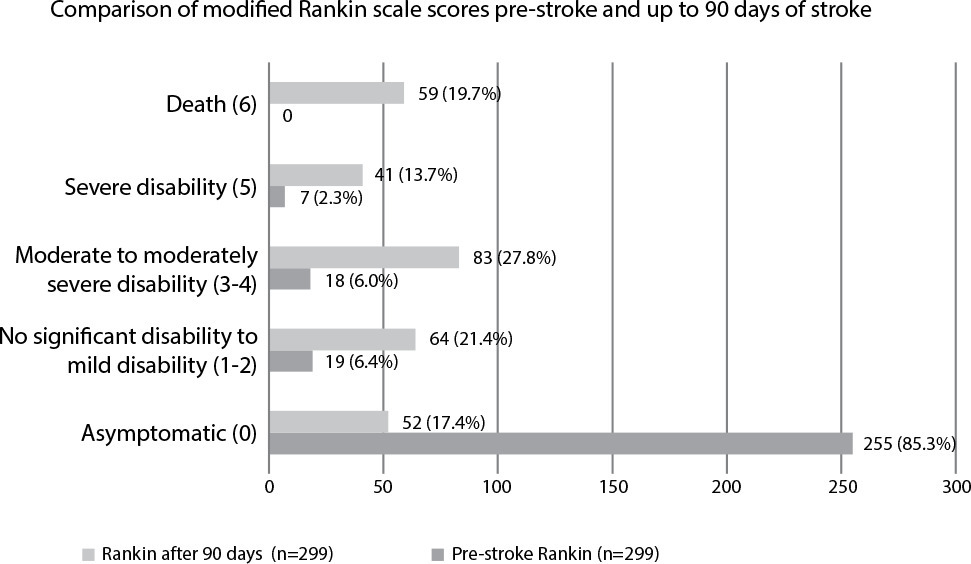
-
EXPERIENCE REPORT02-10-2020
Overcoming the challenges to offer quality training in psychiatric nursing
Revista Brasileira de Enfermagem. 2020;73(1):e20180208
Abstract
EXPERIENCE REPORTOvercoming the challenges to offer quality training in psychiatric nursing
Revista Brasileira de Enfermagem. 2020;73(1):e20180208
DOI 10.1590/0034-7167-2018-0208
Views0See moreABSTRACT
Objective:
to report the experience of the Psychiatric Nursing professors of the Nursing Undergraduate Course of the Nursing School, Universidade Federal de Minas Gerais (UFMG) and the challenges faced to offer quality training.
Method:
This is an experience report about the experience of Psychiatric Nursing professors of the Nursing Undergraduate Course of the Nursing School, UFMG.
Results:
After losing the workload of 120 hours in the Psychiatric Nursing Undergraduate Course, the area developed elective disciplines with a total of 330-hour load, in addition to extension and research projects.
Final considerations:
the precariousness of the area of Nursing training after curricular restructuring in a higher education institution, whether in relation to hour load or in the allocation of teaching vacancies, is in line with advances of the Brazilian Psychiatric Reform and epidemiological data of psychic illness and drug use.
-
ORIGINAL ARTICLE04-09-2020
Nursing work and competence in hemotherapy services: an ergological approach
Revista Brasileira de Enfermagem. 2020;73(3):e20180775
Abstract
ORIGINAL ARTICLENursing work and competence in hemotherapy services: an ergological approach
Revista Brasileira de Enfermagem. 2020;73(3):e20180775
DOI 10.1590/0034-7167-2018-0775
Views0See moreABSTRACT
Objetives:
to analyze the ingredients of the competence that the nurses use in the performance of their work in hemotherapy.
Methods:
qualitative study with 22 nurses, accomplished through documentary study, observation and semi-structured interview, with resources of Atlas.ti software based on the foundations of Historical Materialism Dialectic and Ergology. Performed Content Analysis.
Results:
the domain of specific knowledge of hemotherapy and the time of experience in the area, allied to the motivation of the worker and the ability to work in a team favor the competent action in the work activities. On the other hand, the lack of adequate work conditions, especially in relation to adequate materials, equipment and structure, impairs the work of the nurse in hemotherapy.
Final Considerations:
experience gained is critical to successful decision making. In addition, adequate working conditions, updating of knowledge and ability in teamwork favor a scenario of safe practices.
-
REFLECTION12-13-2019
Women with fetal death: nurses’ care limitations
Revista Brasileira de Enfermagem. 2019;72:365-368
Abstract
REFLECTIONWomen with fetal death: nurses’ care limitations
Revista Brasileira de Enfermagem. 2019;72:365-368
DOI 10.1590/0034-7167-2018-0261
Views0See moreABSTRACT
Objective:
To present the limitations of the nursing care for women with fetal death, reflecting on this challenge for care practices.
Method:
Reflective study with theoretical focus on national and international publications, along with the experience of the authors in the area of women’s health and obstetrics.
Results:
There are limitations related to nursing care, which involve feelings of insecurity and powerlessness, inappropriate attitudes of these professionals in front of women, difficulties to manage emotional aspects, and structural problems of health services.
Final Considerations:
This study points out that there are challenges to qualify nursing care for women with fetal death, which included academic studies and continuing education in health services. Relational aspects should be valued and demand more sensitivity from nurses, with more empathic relationships in the care for women with fetal death.
-
ORIGINAL ARTICLE05-18-2020
Care of wheelchair pregnant women in the light of Collière’s theory
Revista Brasileira de Enfermagem. 2020;73(4):e20180755
Abstract
ORIGINAL ARTICLECare of wheelchair pregnant women in the light of Collière’s theory
Revista Brasileira de Enfermagem. 2020;73(4):e20180755
DOI 10.1590/0034-7167-2018-0755
Views0See moreABSTRACT
Objectives:
to discuss care needs of wheelchair pregnant women in the light of Collière’s Theory of Caring.
Methods:
qualitative, descriptive, exploratory, with eight women, between August 2014 and March 2015, in Rio de Janeiro State, Brazil. The method of data collection was the life history. The theoretical reference used was Marie-Françoise Collière’s Theory of Caring. The thematic type analysis identified three categories: pregnancy planning; support and prejudice of family and health professionals; and caring for the wheelchair pregnant woman.
Results:
prejudice, fear, lack of support, lack of knowledge about the maintenance of pregnancy and childbirth interfered negatively in the process of gestation. Participants had urinary tract infection, miscarriages and preterm birth.
Final Considerations:
gestation in these women should predict possible intercurrences, which makes it imperative to train professionals in integral care to promote and protect health.
-
ORIGINAL ARTICLE06-04-2021
Innovations in the teaching-learning process of psychiatric nursing and mental health
Revista Brasileira de Enfermagem. 2021;74:e20200525
Abstract
ORIGINAL ARTICLEInnovations in the teaching-learning process of psychiatric nursing and mental health
Revista Brasileira de Enfermagem. 2021;74:e20200525
DOI 10.1590/0034-7167-2020-0525
Views0See moreABSTRACT
Objective:
to know innovative pedagogical experiences developed by professors in the teaching of psychiatric nursing and mental health in undergraduate nursing courses at public universities in Rio de Janeiro State.
Method:
based on an ethnomethodological approach, individual semi-structured interviews and document analysis were carried out according to content analysis.
Results:
despite the heterogeneity in the curriculum distribution of psychiatric nursing’s and mental health’s knowledge, the themes taught have similarities. The perceptions of innovation are mainly related to interdisciplinary practices and teaching, relational, and care technologies. Innovative teaching practices are focused on the use of active methodologies and collaborative activities.
Final considerations:
innovating teaching requires creating strategies to teach people how to care for people, valuing human uniqueness. Student participation in health services is the key to the dialogue between knowledge produced in academia and that mobilized in health services.
-
ORIGINAL ARTICLE09-23-2022
Analysis of the concept of cardiovascular risk: contributions to nursing practice
Revista Brasileira de Enfermagem. 2022;75(4):e20210803
Abstract
ORIGINAL ARTICLEAnalysis of the concept of cardiovascular risk: contributions to nursing practice
Revista Brasileira de Enfermagem. 2022;75(4):e20210803
DOI 10.1590/0034-7167-2021-0803
Views0See moreABSTRACT
Objectives:
to analyze the concept of cardiovascular risk to support nursing practice.
Methods:
this is an analysis to define the concept of cardiovascular risk, through the use of eight steps of Walker’s and Avant’s framework, using a literature review in indexed scientific journals.
Results:
cardiovascular risk is defined in a broad and original way as a context of health and nursing care that makes it possible to identify modifiable (cardiometabolic, behavioral, psychosocial, cultural and occupational) and non-modifiable (biological) risk factors for cardiovascular diseases that act as early and interrelated markers, of multiple and heterogeneous etiology, predisposing to cardiovascular vulnerability.
Conclusions:
with the analysis and definition of the concept of cardiovascular risk, we realized that it will be possible to base nursing practice, with implications in clinical practice for identifying and reducing risk factors for cardiovascular diseases, with nursing relevance in the care of these subjects.
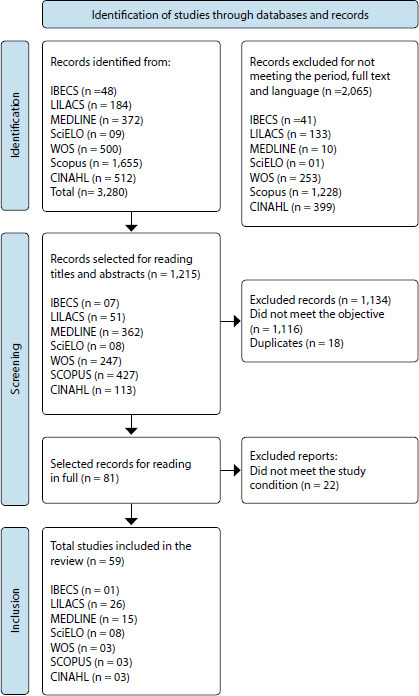
-
ORIGINAL ARTICLE12-05-2019
Health situation in the perception of elderly widows assisted by primary health care
Revista Brasileira de Enfermagem. 2019;72:199-204
Abstract
ORIGINAL ARTICLEHealth situation in the perception of elderly widows assisted by primary health care
Revista Brasileira de Enfermagem. 2019;72:199-204
DOI 10.1590/0034-7167-2018-0549
Views0See moreABSTRACT
Objective:
Analyze the perception of elderly widow women about their health situation.
Method:
Descriptive and exploratory research, based on qualitative approach performed with 34 widowed women aged 60 years and over, enrolled in primary health care. It was used content analysis in its thematic analysis modality.
Results:
Three thematic nuclei were obtained: “positive self-perception of health in old age”, “negative understanding of health related to the diseases” and “negative repercussions of the absence of the husband in the health situation of the widows”. Presence of the family, chronic diseases under control, physical limitations and absence of the partner directly influenced the responses of the elderly widows.
Final considerations:
The elderly widows perceive their health situation as relatively good and some factors are challenges to a better health situation. For the participants, widowhood means more than just the physical loss of the husband, interfering negatively in the perception of their health situation.
Search
Search in:
Nuvem de Tags
Adolescente (85) Atenção Primária à Saúde (239) COVID-19 (91) Criança (91) Cuidados de Enfermagem (269) Educação em Enfermagem (151) Educação em Saúde (139) Enfermagem (930) Enfermagem Pediátrica (86) Estudantes de Enfermagem (77) Estudos de Validação (131) Família (87) Idoso (208) Promoção da Saúde (99) Qualidade de Vida (104) Saúde do Trabalhador (86) Saúde Mental (145) Saúde Pública (82) Segurança do Paciente (150) Tecnologia Educacional (100)



